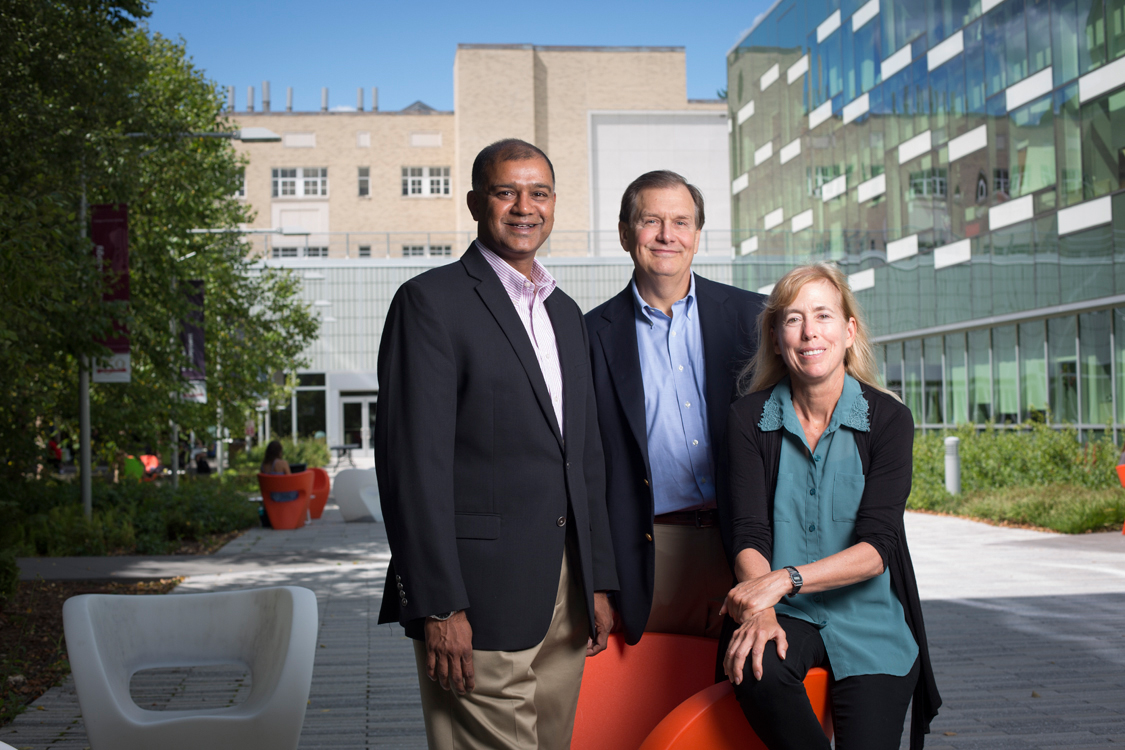New cross-college institute takes holistic view of health
By Kenny Berkowitz

To address modern health care challenges, the College of Human Ecology and the School of Hotel Administration (SHA) have formed the Cornell Institute for Healthy Futures (CIHF), believed to be the world’s first academic center to combine hospitality, design, health policy and management.
CIHF leaders, joined by industry and academic partners, will hold an inauguration celebration Nov. 2 on campus. Activities will include panels on integrating hospitality principles with health care operations, and enhancing health and wellness facility design, followed by a ribbon-cutting at the CIHF suite in Martha Van Rensselaer Hall.
The institute is led by Executive Director Rohit Verma, the Singapore Tourism Board Distinguished Professor in Asian Hospitality Management in SHA, and Associate Directors Mardelle McCuskey Shepley, professor of design and environmental analysis, and Brooke Hollis, MBA ’78, associate director of the Sloan Program in Health Administration. It aims to build a broad-based platform to improve service in health care, wellness and senior living through academia and industry partnerships, said Verma.
“What has never been done before is the integration of these disciplines to promote a more holistic view of health care,” he added. “The institute will focus not only on clinical care, but will pay close attention to the patient experience, the well-being of the family and the long-term emotional needs of patients and their loved ones, all carefully informed by a perspective on design.”
This fall, institute leaders are forming partnerships, establishing fellowships for practitioners and researchers and identifying potential visiting scholars. Current sponsored research projects include studying the role of service and hospitality in patient choice, understanding customer preferences in wellness tourism and assessing the performance of wellness-themed hotels.
“Our approach is more than interdisciplinary,” Shepley said. “It’s transdisciplinary, in the sense that it’s generating a whole new field, rather than having different disciplines work in parallel. We’re excited to be a part of this adventure, which we hope will broaden perspectives regarding the future of health and, through our research, enhance the quality of people’s lives.”
To fulfill its educational mission, the institute has developed a preliminary list of Human Ecology courses to complement SHA offerings, and is considering an undergraduate concentration and a dual-degree master’s program. Directors plan to support Cornell instructors teaching courses in health care and wellness, and expand outreach efforts to undergrads considering careers in design, hospitality or health administration.
“There’s a lot of overlap between these disciplines,” Hollis said. “As more ideas from hospitality are being considered or adopted by the health care industry, and with more research on effective management and design interventions, we’re seeing promising collaborations. It’s an exciting time, and we hope to be innovators and thought leaders in these areas.”
The School of Hotel Administration and College of Human Ecology committed three years of seed funding to launch CIHF. Industry partnerships, alumni gifts and other support are expected to sustain the institute over the long term.
“In the immortal words of E.M. Statler, ‘Life is service,’” said Michael D. Johnson, the Bradley H. Stone Dean and E.M. Statler Professor at the School of Hotel Administration. “Our academics and research are built on the notion that hospitality transcends industry. The Cornell Institute for Healthy Futures represents a natural synergy with our colleagues in Human Ecology – one which will leverage and create collaborative expertise to address the emerging service needs of an evolving health care and wellness industry.”
Said Alan Mathios, the Rebecca Q. and James C. Morgan Dean of the College of Human Ecology: “By supporting the needs of patients and their families in hospitals and other health care settings, this innovative new institute aligns closely with the college’s mission to improve lives by exploring and shaping human connections to natural, social and built environments. We are excited to partner with the School of Hotel Administration to launch this multidisciplinary collaboration that will foster many valuable research, outreach and teaching projects.”
Kenny Berkowitz ’85 is a freelance writer.
Media Contact
Get Cornell news delivered right to your inbox.
Subscribe